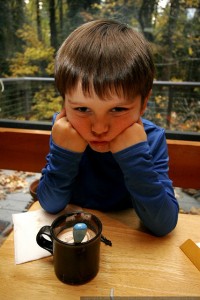
The issues that concern me have more to do with emotions and balance. My son is often highly-intense,easily frustrated, and negative.
Sound like anyone at your house? The above comment, from a mom of boys, reminded me of my oldest son — and of a workshop I’ve attended not once, but twice.
The workshop was Homeschooling Precocious, Sensitive, Intense, Creative (and Otherwise Gifted) Children; the presenter, Lisa Rivero. Giftedness, Lisa says, is more than intelligence. It’s more than high test scores. It’s more than ease of understanding. Giftedness, quite simply, is MORE.
A gifted child, Lisa explains, is one who is more sensitive, intense and creative than others. A gifted child might exhibit strong attachments to people, animals and things. A gifted child may find exceptional delight in beauty. A gifted child may create elaborate imaginative games.
As the parents in the room discussed their gifted children, the pieces began to fall into place. My oldest (at that time, only 7) had always been an extraordinarily intutive child; he’s the kind of kid who can walk into a room and sense the emotional temperature before anyone says a word. At age three, he had not one imaginary friend but an entire work crew. (This was during his construction obsession.) He’s very sensitive to sounds and textures. And the questions! This kid asked probing questions from the time he could talk.
In the book You Know Your Child Is Gifted When…, author Judy Galbraith writes, “gifted kids are often so much more of everything than other kids their ages — more intense, curious, challenging, frustrating, sensitive, passionate.”
Parenting such a child is, of course, a challenge. Strong emotions in a small package are frightening to many parents, especially when coupled with a powerful intellect. And gifted children frequently struggle with other issues as well, including peer relationships and perfectionism.
Do you have a son who is gifted? How is he MORE, and how do you handle it?







3 Responses
I have a daughter who is gifted! She is also more– more emotional, more sensitive, and so afraid to fail. I can not wait to hear about perfection– she has that as well.
Thank you for citing our book, You Know Your Child Is Gifted When…by Judy Galbraith (Free Spirit Publishing). We’re grateful for real-life reviews and recommendations of our books and learning materials! I thought you would like to know that this book is available as a free download at this link: http://bit.ly/5USsQE
I am happy to send review copies, anytime. Perhaps you might like to see Freeing Our Families from Perfectionism, or What to Do When Good Enough Isn’t Good Enough, by Thomas Greenspon? Just say the word!
All the best,
-Jenni
Jenni Bowring
Free Spirit Publishing
bo*****@********it.com
Thank you for the book recommendations! I have a 7 yo so. who struggles (so we all struggle) with intense emotion and perfectionism. It’s so hard, but mostly it’s so sad 🙁 Recently I overheard him telling his little brother, “you need to practice baseball and catching because I want you to be the best in the team.” So now he’s putting his perfectionist behaviors into his brother. 🙁 I stopped him, but it still made me sad.
I also teach middle school at a small private school. Many, many, some days it feels like all, of our students are intense perfectionists. It’s so hard because as a teacher I want them to be able to fail, learn, be resilient, and bounce back. But they aren’t wired that way. It is so challenging and I worry about their futures. As brilliant as all these gifted children are there are some true downsides most don’t see.